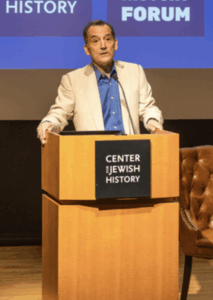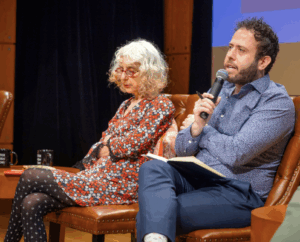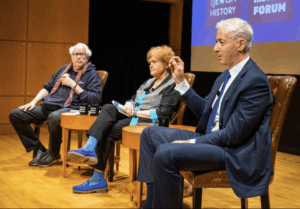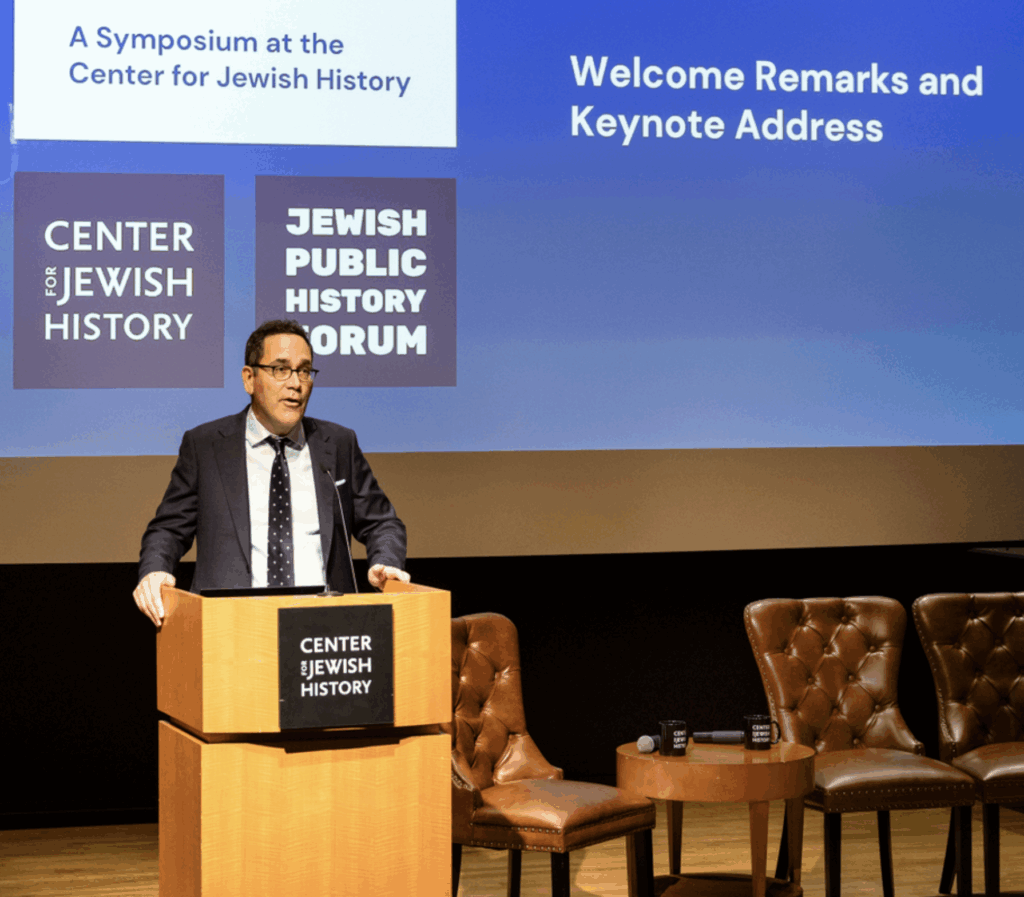The above question headlining the public symposium held on May 18, 2025 at New York’s Center for Jewish History (CJF) could hardly have been more topical. Do we now find ourselves at a point where America’s premier institutions of higher learning have become ideologically and socially inhospitable to their Jewish constituencies? Clearly, the initiating crisis behind this collective inquiry harks back to the anti-Israel protests that convulsed universities nationwide in the wake of October 7th. Trump’s second administration has instrumentalized the issue of antisemitism in a determined campaign to eviscerate the nation’s established cultural and scientific organs. This double-bind became, inescapably, the urgent theme of the day.

Speakers were organized in four panels (recordings are accessible here) including: university faculty — Rebecca Kobrin, Jeffrey Herf, Susie Linfield, Rachel Gordan, Steven Pinker, Nicholas Lemann, Pamela Nadell, Deborah Lipstadt; critics and journalists — Paul Berman, Leon Wieseltier, James Kirchick, Eli Lake; rabbis — David Wolpe, Jason Rubenstein; and the billionaire entrepreneur-philanthropist Bill Ackman. Commentators have reported on the controversy surrounding the program, summarized the tenor of its contribution to current debates, and sneered at the age of participants and audience. I reflect more deeply on threads that tie the discussion overall to my sense of our communal predicament.
After introductory remarks by Gavriel Rosenfeld, President of the CJH [pictured above, courtesy of the CJH, as are all these photos] and Rabbi David Wolpe, four sessions explored from multiple angles the newly charged place of Jews in American academia. Speakers considered: academic institutional histories; the intellectual formation of the professoriate; the impact of October 7th on student life; how discourses that have flourished on campus (e.g., antizionism, “DEI,” intersectionality, queer theory, settler colonialism, etc.) often eject Jews from a speciously universalistic “circle of empathy”; the rhetorical spillover into cultural spaces inhabited by educated elites (e.g., bookstores, literary media).
A US Executive Branch Run Amok
Susie Linfield’s stellar presentation coupled a critique of leftist “virtuous antisemitism” (an expression coined by Jean Améry) with dire warnings of a US executive branch run amok. Anti-Israel sentiments among young people, she argued, stem not least from the spiraling harms of Netanyahu’s 20-year governance and the out-of-control racist violence of the settler movement, even if the campus upheavals also shockingly channeled the eliminationist antizionism of Islamist militants and their Western apologists.

The Trump administration can harp all it wants on combating antisemitism. But the repeated incantation of the “a-word” in Federal edicts cannot magically conceal the real purpose of the multi-pronged war on what Trumpists disparage as bastions of secular liberalism, from law firms to universities. Jews can never be safe under a regime that flouts the rule of law, nullifies Constitutional guarantees of due process, and seeks to crush perceived enemies through capriciously-imposed sanctions. We cannot allow ourselves to be so consumed by “moral panic” over radical anti-Israel hatred — however ideologically driven and constitutive of its own brand of racism — that we fall prey to the shady inducements of a fascistic protection racket (reminiscent of the historical phenomenon of the shtadlan or “Court Jew.”)
James Kirchick and Eli Lake impressionistically covered the fallout of political correctness. Kirchick, though informative (e.g., about the dramatic proliferation of university administrators) ultimately went off the rails. He concluded by directing special ire at the transgender community: “A society that believes this [that men can become women, and women can become men, that biological sex doesn’t exist] will believe anything.” This gratuitous swipe echoed 2024 Republican campaign tactics that had fixated on a minuscule, vulnerable demographic to galvanize populist fury.
Harvard
Steven Pinker’s talk became the basis of an opinion piece published later in the NY Times (“Harvard Derangement Syndrome“). He called for a return to university leadership that stands on principles of academic freedom and pluralism, including the ability of students to participate in campus activities regardless of religious affiliation, ethnicity, nationality, or political/ideological orientation. As Rabbi Wolpe pointed out in his opening keynote, and Jeffrey Herf (session 1) amplified, principled stances sometimes require leaders’ willingness to be “disagreeable.” Upholding principles, for which internal mechanisms already exist, would mitigate the kind of rank displays of blended anti-Zionist, anti-Israeli, and anti-Jewish animosity that occurred post-October 7th.
No doubt calcified progressive orthodoxies around the Israel/Palestine conflict as around gender (e.g., the mistreatment of evolutionary biologist Carole Hooven for defending scientific usage of the terms “male” and “female”) are long overdue for course correction. Indeed, Harvard’s current interim president has acknowledged, and has committed to addressing, institutional blind spots and failures — among them an illiberal intellectual culture in which antizionism and antisemitism have become inextricably entangled.
But the whole of Harvard cannot be reduced to the populist caricatures lobbed by MAGA minions. How does the Trump administration’s chokehold on Federal funds already allocated for scientific and medical research, help to counter antisemitism? Why punish STEM fields when, as Rabbi Wolpe reported a year ago, it was the Divinity School that lived up to its reputation as a hotbed of antisemitism? (As I write these words, news just broke that Harvard has completed the dismantlement of a Divinity School program whose mission to “de-Zionize” “Jewish consciousness,” albeit led by a Jewish Israeli expat, could not be more offensive.)
The closure of labs, the wreckage of experimental protocols, the cessation of data collection, the ruination of promising careers — are all carried out, frighteningly, in the name of advancing Jewish interests. Very many Jews, among them Israelis, are affected by the Federal government’s draconian measures. How will the evaporation, just like that, of a life’s work dispose non-Jews to the Jewish community?
Jews Would Take the Fall
A rational observer can be forgiven for inferring that the Christian nationalist architects of the Trumpist war on Ivy League universities (Vance, Vought, Bannon, Rufo) are deliberately setting up the Jews to take the fall, not merely for personal opportunities lost but also for the negative societal ramifications certain to flow from the defunding and unwinding of science. The strategy is entirely consistent with the Trump administration’s cynical redefinition of “DEI” as shorthand for the alleged elevation of unqualified African Americans and women over white men. Trump then appear to champion Jewish concerns while denigrating other minorities and women in the hope of resegregating the workforce.
Or, as Rachel Gordan (session 2) related about her experience at the University of Florida: under Gov. DeSantis, administrators tread lightly on Jewish studies courses while subjecting other fields to onerous curricular review to root out ideas declared pedagogically illegal. The contrast can only reinforce the widespread complaint of “Jewish privilege.” Pit uppity liberal groups against each other, the thinking goes, the better to forestall coalition-building and resistance to the implementation of “Project 2025.”
Rabbi Jason Rubenstein, formerly the Jewish Chaplain at Yale and currently Executive Director of Harvard Hillel, expanded on Pinker’s argument that university leaders have to be clear about principles. Rubenstein illustrated how a “confusion of roles” and a logic of discriminating between Jews over their so-called “Zionism” had already taken root at Yale before October 7th. For example, a refusal to mentor a first-year student in a biology lab for choosing to take a course in modern Hebrew constitutes unprofessional conduct antithetical to the university’s core mission.
And when faculty who had invited a notorious pro-Hamas speaker to campus were asked point blank to distance themselves from the group’s murderous tactics targeting Jews, they refused, explaining that “Sharing an increasingly diverse campus means sharing it with people to whom Hamas means many different things.” The question was posed in memory of Yale alum Matt Eisenfeld ’93, killed in a 1996 Jerusalem bus bombing. Thus Jews murdered at the Tree of Life Synagogue by a rightwing extremist were deemed grievable, but not Yalies who travel to Israel.
Nicholas Lemann, co-chair of Columbia’s task force on antisemitism, broached to my mind the key problem underlying the sifting of acceptable and unacceptable Jews that Rubenstein described. Zionism, Lemann averred, is now represented as something foreign and utterly inimical to authentic Judaism. Accordingly, the obsessive bashing of this “Zionism” and the expulsion of “Zionists” from enlightened precincts cannot be anti-Jewish.
The inoculation of antizionism from the opprobrium nominally attached to antisemitism in the West merits further comment. The alienation of Zionism from its Jewish sources of inspiration complements the fiction of a pure, unadulterated Judaism severed from and floating above history, divorced from the evolution of how Jews view themselves. The portrayal of Zionism as the creature of Western imperialism and settler colonialism needs the corresponding portrayal of Judaism as a religion in the transcendent, universalist mode that has purchase in Western (majority Christian) societies.
Such a double distortion fuels the operation of a shibboleth. Zionism stigmatizes Jews obstinately clinging to a corrupted identity. Antizionist Jews, disabused of “false beliefs,” redeem Judaism. No wonder that at Harvard Divinity School they would be lionized as the salvation of “Israel” (i.e., the people of the BIble). Progressive Christian orthodoxies, too, recruit Jews into scripted roles.
Sparks Fly at Final Panel
The final session featured Deborah Lipstadt, Bill Ackman, and Leon Wieseltier, their divergent views animating the audience. Lipstadt confessed that she had initially thought some of the reforms sought by the Trump administration might be effective, but had come to regard the over-the-top, heavy-handed Federal interference in universities as detrimental to the work of staunching antisemitism. The pretextual resort to antisemitism as cover for bringing universities to heel only encourages the denial of its existence altogether.

After tearing into Trump’s policy on universities as an outright sham and abuse of Federal powers, Wieseltier echoed Paul Berman’s (session 1) insistence that the proper path forward is to engage in “the battle of ideas.” No ideology, reminded Berman, had ever been defeated by fiat. Jewish students, said Wieseltier, must be better prepared to counter the false representation of Zionism and the vilification of their identity with more and deeper knowledge.
He also spoke powerfully about the carnage that Israel’s prosecution of the war against Hamas has wreaked in Gaza. How could the horrors fail to ignite protest? We can harp all we want on the strategy of Hamas to shield its deployment behind the Palestinian people and civilian infrastructure. Still, the refusal of the Israeli government even now to end this war and bring home the hostages exposes its perversion of Zionism and betrayal of the Jewish people.
Ackman was the lone voice of the day in support of Trump. Scholars who signed a letter decrying that the CJH had given him a platform needn’t have worried. To be sure, Ackman is a smooth performer, practiced in the art of delivering well-honed talking points. Here, he maintained that Trump’s policy was all about the good stewardship of tax-payer dollars and ensuring an efficient use of funds toward appropriate ends. Trump isn’t anti-science, he assured us; researchers will simply move their labs to Vanderbilt or Duke.
But Ackman’s shilling on behalf of the Trumpist crusade against Harvard destroyed any credibility he may have had as a thoughtful “change agent.” Science is not some pop-up enterprise – just pick up your lab and go wherever, whenever. And if the Trumpists are not anti-science, how to explain the budgetary gut punches to the NSF and the NIH or the ridiculous screening of research proposals for terms that might possibly smack of DEI? Either Ackman is hallucinating, or he is motivated, like Trump, by sheer vendetta.
About Harvard’s principled decision to fight Trump’s hostile takeover, he said, tellingly, “If I were chairman of the [Harvard] corporation, I could resolve this litigation with Trump in a day.” (Who publicly boasts like that? Oh yes, the man who proclaimed, “I alone can fix it,” and that he could “solve” Ukraine and Gaza on “day one.”) Yet Trump always reneges on a “deal” because he thinks he can extract more; his appetite for domination, ego-gratification, and humiliating his adversaries is insatiable.
The fact that Trump consorts with antisemites and white supremacists and has appointed them to important positions, the fact that his actions amount to a naked grab for power in which superrich players bankroll a Christian nationalist vision — all the hypocrisy, cruelty, and criminality of his administration still does not mean that the hatred pouring out of the encampments should be brushed off as a mirage. The giddy celebration of Hamas’s October 7th butchery, on campuses and among some progressive literati, irrevocably transformed the nature of antizionism. There is today no other kind than the eliminationist variety. The peaceable one-state binationalism of yore, unrealistic to begin with, has definitively ended.
Monsters from Opposing Directions
On the night of May 21st, three days after the symposium, a Chicago-born English literature major went to a Jewish event at the Jewish Capital Museum in downtown Washington DC and gunned down Israeli embassy staffers Sarah Milgrim and Yaron Lischinsky: “For Gaza” and to “Free Palestine.” In Boulder, Colorado, on June 1st, the exclamation to “end Zionists” accompanied the attempt to set on fire Jews who gathered weekly to raise awareness of the plight of the hostages. At a vigil for Milgrim and Lischinsky on June 10th, American Jewish Committee CEO Ted Deutch declared that:
There should be no more debate about which kind of antisemitism [from the extreme left to the extreme right] is more dangerous, or which we need to be more afraid of … [C]alls to “globalize the Intifada” and chants [of] “from the river to the sea” … must be called out for what they are. They are not slogans for a social justice movement. They are incitement[s] to violence.
We need to confront with equal determination the monsters that use Jews as tools to destroy adversaries and those that invoke Palestinians as a reason to murder Jews.
Marcia Kupfer